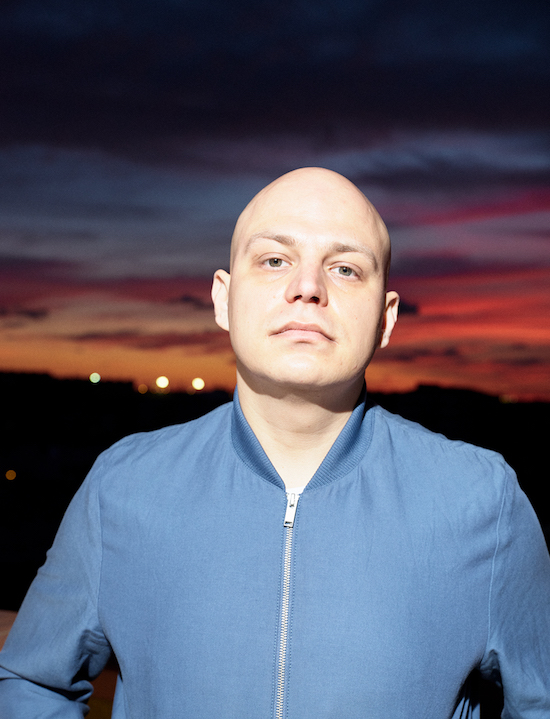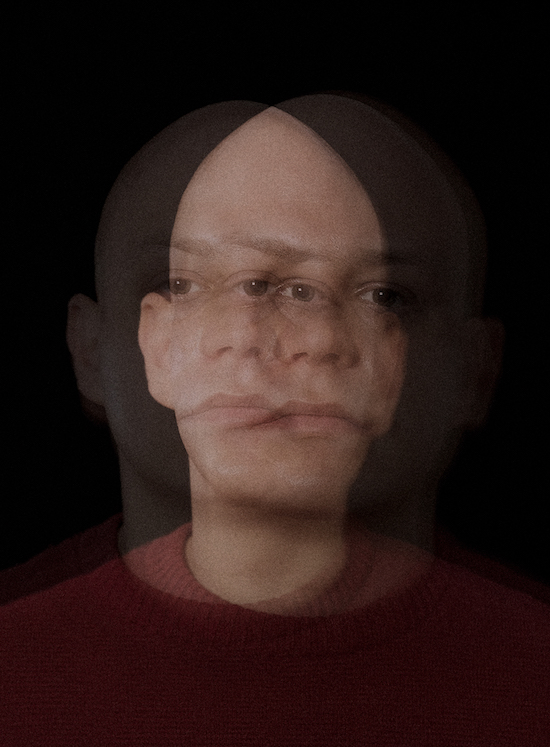Ivan Zoloto by Dani Pujalte
The music video for Karelian artist Ivan Zoloto’s newest album, Pleasure Prison, is a found footage montage stripped of context, its grainy sequences depicting sun-flared scenes of nature and domesticity absent of any time or place. A child pries open a piggy bank; a woman dances with a teenaged boy around a floral wallpapered-living room; a father poses with his daughter at the base of a hooked mountain range. Their feet are planted in an undulating field of wind-whipped violets, their eyes are locked on the camera’s studied gaze.
These images’ tender melancholy is a perfect mirror of Zoloto’s magnificent and mournful elegy, which layers pitch shifting drones and a distorted violin in a compositionally simple yet emotionally powerful threnody that folds and climbs over the course of nearly 40 minutes. The rest of the LP, which will be released February 26 on his newly-minted label, School Of The Arts, is just as beautifully cinematic and contextually unhinged. An exercise in psychogeography, improvisation, and homespun analogue recording, Pleasure Prison is Zoloto’s best and most ambitious solo work, a demonstration of the rising artist’s penchant for the aesthetically eerie and his indebtedness to a long-standing DIY mentality.
Zoloto’s roots in the Karelian capital Petrozavodsk deeply shaped his musical taste and compositional approach. An industrial outpost in Russia’s northwestern-most quadrant, the modest city is hours from any cultural capital and, based on a quick Google Image search, filled with Soviet-style housing blocks, a deserted waterfront, and seemingly limitless fields of subarctic ice. It’s a “pretty weird place,” in Zoloto’s words, because it’s situated at the intersection where Russia and Finland meet. The region has four official languages that include Vepsian, Finnish, and Russian as well as its own, Karelian, that has over 20 sub-dialects and “a lot of identity problems,” just like the territory itself.
Removed from the distractions of big city life, Zoloto developed and refined his musical focus from a preternaturally early age. Claiming he didn’t want to spend money on sweets and chocolate that would be gone a minute after he purchased them, he invested his pocket money in cassettes and CDs instead, amassing more than 100 by the time he was nine. He started his first band at 12 (never having learned an instrument, he was always the singer), drawing inspiration from the punk music he hungrily consumed from his childhood bedroom, the noise scenes he heard blossoming in the U.S. and Japan, as well as his growing obsession with artists like Yamatsuka Eye, Zeni Geva, Crank Sturgeon, and Wolf Eyes. “No melodies, no resonance,” he said. “Proper free harsh stuff.”
Still, Zoloto felt he needed something crazier and “less normal” than what he was playing in these various hardcore outfits. It wasn’t until he saw his first in-person noise show that he grew excited about the spectacle of performance and the ethos of experimental DIY culture. That night, the band members played in an abandoned factory; they were wearing dada-inspired costumes, provoking the audience, and destroying their instruments in splintery explosions on stage. “It literally blew my mind,” he said, inspiring him to install a broadband connection at home so as to have greater access to the sounds and sights emanating from this new and unexplored musical world.
Zoloto began cultivating the creative visions that came from his initial experiences watching experimental noise. He joined the artist MAAAA in a duo where Zoloto would scream and scrape microphones on stage while MAAAA generated loops through half-broken pedals. They always improvised, often joining multi-person improvisation collectives that engaged in dramatic experiments with distortion and delay, forming endless iterations of dynamic and hours-long dirge-y drones.
Even after having moved to Moscow at 26 – and then to Shanghai, Chicago, San Francisco, and now Barcelona, where he currently resides – he’s remained indebted to these early musical encounters, foregrounding extensive collaborations, hardware-only live recordings and self-releases, and Karelian and Finnish artists and instruments. Pleasure Prison is a testament to this ideological commitment. On ‘Problem no. 1’ and ‘The Door Is Open’, he plays a traditional Karelian-Finnish folk instrument called a Joukikko, a kind of medieval-looking three-stringed bowed lyre. The violinist on the album’s title track, Sasha Kretova, is also of Russian-Finnish descent.
“She had a chance to go to a festival where I was playing, so I asked if she’d bring her violin,” he said. They ended up improvising around Zoloto’s sketch and recording the piece without rehearsal or preparation in one live take. Zoloto says it’s more fun to produce this way than to toil over arrangements or edits. He doesn’t have a dedicated computer or an audio interface at home, desiring for his music to remain compositionally pared-down and off-the-cuff. While he had to process the recordings in the LP’s first and last tracks, he affirmed that “it wasn’t in such a way that I knew exactly where the sound was coming in.” It was between this bizarre mixing board set-up and an array of Soviet effects pedals that the thrust of Pleasure Prison was born.
There are moments of dark claustrophobia and raw-throated horror that course through the album’s six long-playing tracks. ‘The Door Is Open’ creaks and keels under the Jouhikko’s guttural thrum while an analogue clatter ricochets in a shrill counterpoint. The other songs riff on these themes, looping thick layers of distortion over gnarled open strings, occluded synth lines, and dynamic bursts of haptic noise. ‘Problem no. 1’ ends with a distinct “click”, conjuring an image of Zoloto at the door of a safe, slowly rotating its tumblers until the vault door swings open.
The sentiments behind these dark textures stem from feeling alienated in Petrozavodsk for the majority of his life. “I’m very drawn to that world of sadness, apathy, and mental problems,” he said. “I feel at home there, even though it’s not what I want my life to be.” This acute sense of isolation – as well as the hedonism that often accompanied it as a way to cope – informed the album’s title and artwork, which refer to the German concept of freizeitknast: escapism that gradually becomes a trap.

Ivan Zoloto by Dani Pujalte
But one corollary of being confined to Karelia was that Zoloto created strong ties to its other musicians. Being distant from cities and the industries within them also helped him establish a deep appreciation for a community based on self-reliance, inclusivity, and interdependence. Zoloto’s travels over the last few years have seen him finding and nurturing friendships in similar underground music scenes around the world, a phenomenon he referred to as a “sacred geography”. “You can have no cultural connections to a place whatsoever, and at the same time, you can have all the cultural connections,” he said. Chicago especially left him “bubbling with energy” after only four months spent meeting and working with its local musicians.
The DIY spirit is the bedrock upon which he’s built his life. He taught himself English by re-reading old copies of The Wire magazine, eventually writing an article for them entitled Mosh Pit Manners about how he fosters financial transparency in running his label, School of the Arts (the feature even includes a ledger of where his expenses go, including production costs, shipping costs, and number of sales). “I feel great telling prospective artists, ‘I can’t offer you much, and here’s how the whole thing works,” he writes, “‘but I do love music and it’d be a pleasure to have you here.’” It’s a refreshing perspective in a world too often dominated by aspirations of widespread recognition and monetary success.
In spite of the pandemic and its attendant limitations, Zoloto has continued to seek out unusual projects that remain true to his values and vision, building on a fascination with geographic displacement and underground musical traditions years in the making. His next solo album, which is already nearing completion, was recorded with a folk choir in Teriberka, Russia, a 900-person village near the Arctic Circle. “It’s basically just a self-organised group of women singing folk songs,” he explained. He wrote a very simple piece, recorded them singing it live, and added parts for synthesizer. He’s also in the midst of mixing down a record with his new psychedelic sludge metal band, Petrozavodsk – named after his hometown – and recording a series of post-industrial pieces with a “very obscure Australian artist”. Like his solo work, their music is all strictly improvisational.
At his home in Barcelona, Zoloto is patiently awaiting the day when he can attend shows and play the music he’s been working on. He was booked for a festival in May 2021, which “seems crazy” in the middle of a global lockdown, but he prays it will come to pass. The energy that comes from discovering exciting and unknown artists in these collaborative contexts is what sustains him. He imagines the catharsis that this re-entry into public musical performance will bring: covered in dirt and sweat, he’ll be caught in a salvo of volleying noise, listening to strange sounds with mysterious provenances and narratives that haven’t yet been told.
Pleasure Prison is out on Friday and available to preorder now


